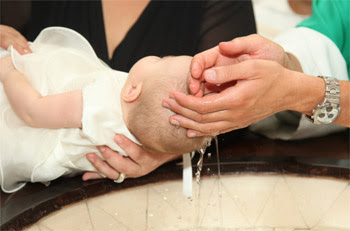Are babies or little children held accountable for the original sin?
Over the years, the church has baptized little babies since they believed that the “original sin” from Adam is inherent in them. Out of good will, the parents and the church did not want their children to be lost. Hence, they established a doctrine for baptizing little children, so that if they die young, they will be saved from eternal judgment. Is that a true biblical doctrine? Are little babies and small children sinful and face condemnation? If they die today, will they face God’s wrath of judgment just like the unbelievers?
The answer to all these questions is a big NO. Little children and babies even though they have the “original sin” in them, they are not held accountable to it, nor are they held in condemnation for their sinful acts, during this tender age.
When we see little babies and little children, we adore them for their silliness and love them for their childish behavior. When a little child steals from another kid or perhaps tells a lie, we as adults laugh at it, since we know that these little ones have no understanding of morality. They have not reached a state of understanding between right or wrong but do bad things naturally. However, if they were to reach a state of adulthood, the society would punish them or perhaps take legal action against them for the same innocent acts they did as little children.
In the Judaic religion when a child reaches an age of accountability, the Jews celebrate the “Bar-bas-bat-mitzvah” as the transition from childhood to adulthood, that is when they become morally responsible for their actions. This celebration happens at age 13 for boys and 12 for girls. Even though this age is set in Judaism, but in reality, some children could vary by a few years for them to be truly morally responsible. No matter what age that maybe, but there is a time, when children become morally responsible for their sinful acts. These sinful acts are an outcome of the original sin that is inherited from conception and resides in the lives of children, which is called as “personal sin.”
Paul tells us when Jesus Christ died on the cross and was resurrected on the 3rd day, he conquered both sin and death from our lives. This conquering is partly referring to the conquering of the original sin. 1 Corinthians 15:57 (NLT) "But thank God! He gives us victory over sin and death through our Lord Jesus Christ."
Paul further tells us in Romans 5:18 (ESV), that original sin condemned man and woman, but Jesus took on that so that we might become righteous before a Holy God. "18 Therefore, as one trespass led to condemnation for all men, so one act of righteousness leads to justification and life for all men."
Even though little babies have a sin nature in them, Jesus took on the original sin upon himself so that we all can become right or sinless before a Holy God. 2 Corinthians 5:21 (ESV) For our sake he made him to be sin who knew no sin, so that in him we might become the righteousness of God.
Based on that, we can say, that all babies and little children – Christian or non-Christian having the original sin in them, will not be condemned for that original sin if they die as babies or little children before the age of accountability. The reason is, Jesus has already paid the price of their original sin on the cross through the resurrection of Christ.
From the beginning of time, God established a “book of life,” where he had the names of all the people who will be born on this earth. However, with the advent of the original sin, all men were condemned to hell by default. Interestingly in Revelation 3:5 Jesus tells us that he will not blot out of the book of life for those who are covered by the blood of the lamb. Little babies and little children are automatically covered by the blood of the lamb since they have no understanding of morality. Hence, if they die in their childhood, their names will never be blotted out of the “book of life.” Rev 3:5 (ESV), “The one who conquers will be clothed thus in white garments, and I will never blot his name out of the book of life. I will confess his name before my Father and before his angels.”
However, once these children cross the age of accountability, they will be held accountable for the personal sin that they commit, which is an outcome of the inherent original sin. This is sin that we commit, in-spite of knowing the truth of God and the moral standards of God. To be saved from this personal sin, one needs to accept Jesus as a personal savior, recognize his inherent sin nature, seek repentance of his/her sins that they committed and then he/she will be saved. This why we see in Rev 3:5 that the one who conquers will be clothed in white garments, referring to the fact that the blood stain of Jesus on our personal sin, takes away the condemnation from God and clothes us with righteousness that no one can take away.
To understand this concept better. Let’s imagine a teacher gives 100% to each student at the beginning of the class as their final grade. This is how salvation is, which is given freely to all people since Christ has already died on the cross and resurrected. However, it is up to each one of us to keep our name in the book of life, by simply accepting the work of Jesus on the cross and seeking the repentance of our sins. If we willingly reject God’s mercy and refuse to accept God’s redemption plan, then God will blot out our name from the book of life.
God being merciful and just, waits until our last breath on this earth to give us one last chance to accept him, which is why we see in Hebrews 9:27 (NLT) "And just as each person is destined to die once and after that comes judgment. If they fail to do so, their names are removed from the Book of Life."
For those people whose name will remain in the book of life, will be the ones who have overcome both consciously and deliberately the sinful nature that persists in us, through the blood of the lamb with the help of the Holy Spirit. Without His spirit in us, we will never retain our 100% marks on salvation.
So, no matter if churches or parents seek to baptize little children or babies, the children are sinless in the eyes of God, they are not held accountable to it, nor are they held in condemnation for their sinful acts, and their names will stay in the book of life, either before the baby baptism or after baby baptism.
However, the book of life should remain as a stark warning for those who intentionally suppress the knowledge of truth of God and reject Christ. Since they are in danger for their names to be removed from the book of life.



Comments
Post a Comment